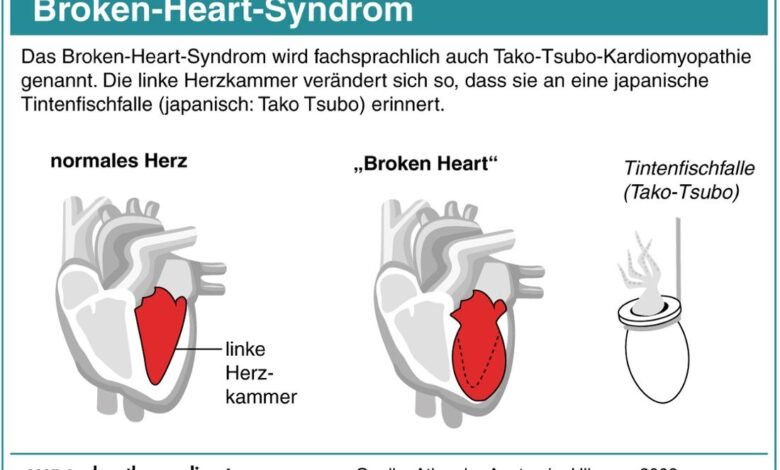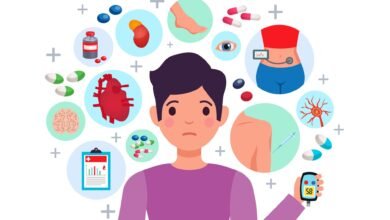Broken Heart Syndrome: Understanding the Connection Between Emotions and Heart Health

What Is Broken Heart Syndrome?
Broken Heart Syndrome, also known as Takotsubo Cardiomyopathy, is a temporary heart condition that mimics the symptoms of a heart attack. It is often triggered by intense emotional or physical stress, such as the loss of a loved one, a traumatic event, or even a sudden surprise—hence the poetic name, “Broken Heart Syndrome.”
While it may feel like a heart attack due to chest pain and shortness of breath, it’s not caused by blocked arteries but rather a sudden weakening of the heart muscle. This condition primarily affects the heart’s left ventricle, which temporarily balloons and changes shape, disrupting normal blood flow.
What sets Broken Heart Syndrome apart is its reversibility. Unlike heart attacks that may cause permanent damage, the heart muscle typically recovers fully within days or weeks with proper care. Understanding this phenomenon sheds light on the profound connection between emotional and physical health.
Causes: The Heart’s Reaction to Stress
Emotional Triggers
Emotions can have a powerful impact on our physical well-being. Intense emotional stress—such as grief, fear, or anger—can lead to the release of stress hormones like adrenaline. In Broken Heart Syndrome, a sudden surge of these hormones overstimulates the heart, causing temporary dysfunction. This is why the condition often follows life events such as:
- The death of a loved one
- A breakup or divorce
- Financial crises
- Major life changes, like retirement or relocation
Even positive stressors like winning the lottery or a joyful surprise can trigger this condition in rare cases. The emotional component makes Broken Heart Syndrome unique compared to other cardiac issues.
Physical Triggers

Physical stressors can also induce this condition. For example, a severe illness, surgery, or even extreme physical exertion can push the body into a state of distress that affects the heart. Other physical triggers include:
- Severe asthma attacks
- Neurological conditions such as strokes or seizures
- Sudden blood loss
Interestingly, women, especially those post-menopause, are more prone to Broken Heart Syndrome. Hormonal changes are believed to play a role, making the female heart more vulnerable to stress-related events.
Symptoms: How to Spot Broken Heart Syndrome
The symptoms of Broken Heart Syndrome can be alarming because they closely resemble those of a heart attack. Here are the common signs to look out for:
Chest Pain and Shortness of Breath
Most people experience sudden, sharp chest pain accompanied by difficulty breathing. These symptoms often come on quickly and can feel identical to those of a heart attack. If you’re experiencing these, seek immediate medical attention to rule out more severe conditions.
Heart Palpitations and Fatigue
Some individuals report feeling their heart racing or skipping beats. Others may feel extremely tired or weak, even without exerting themselves. These symptoms are also related to the heart’s temporary inability to pump blood effectively.
Emotional and Physical Stressors as Clues
A telltale sign of Broken Heart Syndrome is its link to a recent emotional or physical stressor. If symptoms occur shortly after a traumatic event or intense stress, it’s a key indicator that the heart’s response may be due to this syndrome rather than a heart attack.
Diagnosis: How Doctors Confirm It’s Not a Heart Attack
When someone arrives at the hospital with symptoms of a heart attack, doctors typically perform several tests to determine the cause. These include:
Electrocardiogram (ECG)
An ECG measures the heart’s electrical activity and helps identify abnormalities. While both a heart attack and Broken Heart Syndrome can show irregularities, the patterns often differ, aiding in diagnosis.
Blood Tests
Enzyme levels in the blood rise during a heart attack, but in Broken Heart Syndrome, these levels may not be as elevated. Blood tests can provide essential clues to distinguish between the two conditions.
Imaging Tests
Doctors often use echocardiograms or cardiac MRIs to assess the heart’s structure and function. In Broken Heart Syndrome, the left ventricle appears ballooned, a distinctive feature that differentiates it from a heart attack.
Treatment: Restoring the Heart’s Strength
The good news about Broken Heart Syndrome is that it’s usually reversible. With proper care, most people recover fully within a few weeks. Treatment focuses on relieving symptoms and addressing the underlying stress.
Medications
Doctors may prescribe beta-blockers or ACE inhibitors to help regulate heart function and manage blood pressure. In some cases, medications to reduce anxiety or depression are also recommended to prevent future episodes.
Lifestyle Adjustments
Managing stress is crucial for recovery and prevention. Techniques like meditation, deep breathing exercises, and regular physical activity can help keep stress levels in check. Building a strong support system of friends and family also plays a vital role in emotional healing.
Follow-Up Care
Regular check-ups are essential to monitor heart health and ensure complete recovery. Although rare, recurring episodes can happen, so staying vigilant about symptoms and stress management is key.
Prevention: Keeping Your Heart Safe from Stress
While it’s impossible to eliminate all stress, there are steps you can take to reduce the risk of Broken Heart Syndrome:
Practice Stress Management
Incorporate stress-relief activities into your daily routine. Whether it’s yoga, mindfulness, or simply taking time to relax with a book, finding ways to unwind can significantly benefit your heart.
Stay Active
Regular physical activity not only strengthens the heart but also helps release endorphins, the body’s natural stress relievers. Aim for at least 30 minutes of moderate exercise most days of the week.
Seek Support
Don’t hesitate to lean on loved ones during tough times. Talking about your feelings and sharing burdens can prevent overwhelming stress from taking a toll on your heart.
Conclusion: A Reminder of the Heart’s Fragility
Broken Heart Syndrome serves as a powerful reminder of how deeply our emotions are connected to our physical health. While it’s often a temporary condition, its symptoms can be frightening and should never be ignored. By understanding the causes, symptoms, and preventive measures, you can protect your heart from the impacts of stress and lead a healthier, more balanced life.
If you or someone you know experiences symptoms of Broken Heart Syndrome, don’t hesitate to seek medical attention. With the right care and support, the heart has an incredible ability to heal—even from heartbreak.



